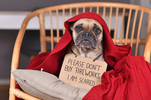
Keeping Pets Safe During Fireworks - Tips for a Stress-Free New Year
, by Majella Gee, 16 min reading time

, by Majella Gee, 16 min reading time
Keeping Pets Safe During Fireworks

As we welcome the New Year, celebrations often include dazzling fireworks displays. While these bright bursts of colour are a spectacle for us, for our pets, they can be a nightmare.
Did you know that dogs and cats hear up to four times more clearly than humans? What might seem like a loud pop to us can sound like a deafening explosion to them. The unpredictable sounds and flashes trigger a fight-or-flight response, leaving many pets terrified and disoriented.
Every year, countless animals are lost, injured, or worse due to the chaos fireworks cause. This blog explores how to keep your pets safe, what to do if you find a stray animal, and why fireworks have a much larger impact—on wildlife and the environment as well.
The Hidden Dangers of Fireworks
Companion Animals
Fireworks create a perfect storm of stress for pets:

Wildlife
Fireworks are just as stressful for wildlife, disrupting ecosystems and behaviours:
Environmental Impact
Fireworks aren’t just loud—they’re harmful to the environment too:

How to Keep Your Pets Safe
1. Plan Ahead
Preparation is key to keeping pets calm and secure:
2. Use Calming Aids
3. Keep Pets Indoors
4. Tire Them Out
Take your dog for a long walk or play an extended game of fetch earlier in the day. A tired pet is less likely to be agitated during fireworks.
5. Stay Calm Yourself
Animals are incredibly intuitive and pick up on their owner’s emotions. Keep your voice calm and your actions steady to reassure your pet.
What NOT to Do

If You Find a Stray Animal
Fireworks often lead to lost pets wandering the streets. Here’s how you can help:
What to Do if You Find Injured Wildlife
Wildlife can suffer significant harm from fireworks. Here’s what to do if you find an injured animal:
Celebrate Responsibly

While fireworks are a traditional part of New Year’s celebrations, we need to recognize their impact on animals and the environment. Consider alternatives like silent fireworks or light shows to reduce harm.
By planning ahead, keeping pets safe, and helping stray or injured animals, we can ensure that everyone—including our furry and feathered friends—enters the New Year on a positive note.
A Call to Action
As the New Year approaches, make a commitment to protect the animals around you. Whether it’s comforting your dog, securing a lost pet, or rescuing wildlife, every effort counts.
Let’s start the year with compassion, care, and responsibility. Together, we can ensure a safer, kinder world for all creatures.
Author: Majella Gee
Models: Main image - Scout the Pug, Benson, Trixie, Hope, and Pip the Party Dog.
#MajellasPetStore #PetSafety #KeepPetsSafe #FireworksAndPets #LostPets #PetMicrochip #ReunitePets #FireworksSafety #NewYearsEveSafety #ProtectWildlife #SayNoToPollution #WildlifeAwareness #NewYearWithPets #ResponsiblePetOwner